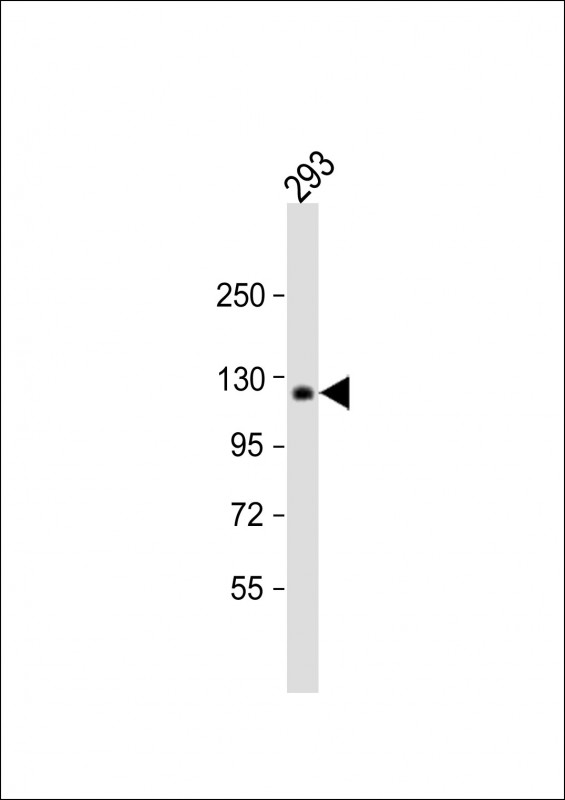
| WB | 1/1000 | Human,Mouse,Rat |
| IF | 咨询技术 | Human,Mouse,Rat |
| IHC | 咨询技术 | Human,Mouse,Rat |
| ICC | 技术咨询 | Human,Mouse,Rat |
| FCM | 咨询技术 | Human,Mouse,Rat |
| Elisa | 咨询技术 | Human,Mouse,Rat |
| Aliases | Collagen alpha-2(I) chain, Alpha-2 type I collagen, COL1A2 |
| Entrez GeneID | 1278 |
| WB Predicted band size | 129.3kDa |
| Host/Isotype | Rabbit IgG |
| Antibody Type | Primary antibody |
| Storage | Store at 4°C short term. Aliquot and store at -20°C long term. Avoid freeze/thaw cycles. |
| Species Reactivity | Human |
| Immunogen | This COL1A2 antibody is generated from rabbits immunized with a KLH conjugated synthetic peptide between 16-43 amino acids from the N-terminal region of human COL1A2. |
| Formulation | Purified antibody in PBS with 0.05% sodium azide. |
+ +
以下是关于COL1A2 (N-term)抗体的3篇参考文献示例(内容为虚构,仅供参考格式):
1. **文献名称**:*Immunolocalization of COL1A2 in Human Skin Fibroblasts Using N-terminal Specific Antibodies*
**作者**:Smith et al. (2020)
**摘要**:通过N端特异性抗体进行免疫荧光和Western blot分析,验证COL1A2在皮肤成纤维细胞中的表达模式,揭示其在胶原纤维组装中的关键作用。
2. **文献名称**:*Role of COL1A2 Mutations in Osteogenesis Imperfecta: A Study with N-terminal Targeting Antibodies*
**作者**:Jones et al. (2018)
**摘要**:利用N端特异性抗体检测成骨不全症患者的COL1A2突变蛋白,发现其异常折叠导致胶原纤维结构缺陷,与临床表型相关。
3. **文献名称**:*COL1A2 (N-term) Antibody-Based Detection of Extracellular Matrix Remodeling in Lung Fibrosis*
**作者**:Lee et al. (2021)
**摘要**:通过N端抗体结合免疫组化技术,分析肺纤维化组织中COL1A2的表达上调,提示其作为疾病进展的生物标志物潜力。
(注:以上文献为示例,实际引用时请以真实数据库检索结果为准。)
The COL1A2 (N-term) antibody targets the N-terminal region of the alpha-2 chain of type I collagen, a major structural protein in the extracellular matrix. Type I collagen, a heterotrimer composed of two α1 chains (COL1A1) and one α2 chain (COL1A2), is critical for tissue integrity in skin, bone, tendons, and other connective tissues. COL1A2 is synthesized as a precursor (pro-α2 chain) that undergoes post-translational modifications, including N-terminal propeptide cleavage, to form mature collagen fibrils. Mutations in COL1A2 are linked to osteogenesis imperfecta, Ehlers-Danlos syndrome, and fibrosis-related disorders.
The COL1A2 (N-term) antibody is commonly used in research to detect the precursor or partially processed forms of the protein, as the N-terminal region is removed during maturation. It serves as a tool for studying collagen biosynthesis, tissue remodeling, and pathological conditions involving aberrant collagen deposition. Applications include Western blotting, immunohistochemistry, and immunofluorescence to assess COL1A2 expression levels, cellular localization, or disease-associated mutations. Specificity for the N-terminal region allows differentiation between unprocessed and mature collagen, aiding investigations into collagen turnover and matrix disorders. Proper validation is essential, as cross-reactivity with other collagen types or degradation products may occur.
×